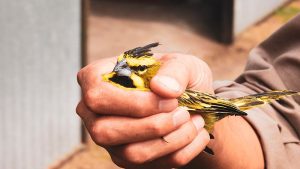Three men were prosecuted for the crime of aggravated attempted smuggling of wildlife, after being caught in October 2023 while attempting to transport over a hundred wild birds to Uruguay from the town of Villa Paranacito in Entre Ríos.
The operation was carried out by personnel from the Argentine Naval Prefecture, who detected a motorboat occupied by two men. One of them was carrying a 16-gauge shotgun without documentation. Both admitted to engaging in illegal hunting in the area.
The situation worsened when a third man arrived at the scene in a truck loaded with 117 birds. Among them were 95 specimens of Yellow Cardinal (Gubernatrix cristata) —six of which were already dead— and 22 Puna Siskins (Spinus atratus), a species native to the Andean highlands.
The birds were confiscated and taken to the Refugio Vida Silvestre Parque Pericos, located in Concepción del Uruguay, for their protection and eventual recovery.

Wildlife trafficking threatens native species
Despite the seriousness of the incident, the three individuals were prosecuted without pretrial detention, and Federal Judge Hernán Viri ordered a seizure of 100,000 pesos on the assets of each defendant. The case highlights a persistent problem: the illegal trafficking of wild birds, driven by high demand and inadequate oversight.
Environmental organizations warn about the lack of effective controls in Entre Ríos, a province that has become a frequent corridor for the illegal trade of protected species. Among the seized birds, the Yellow Cardinal, considered endangered at both national and international levels, is particularly coveted in the black market for its song and plumage.
The National Wildlife Law No. 22,421 prohibits the capture, possession, and commercialization of native species. However, deficiencies in environmental monitoring and limited enforcement resources allow these types of crimes to continue affecting Argentine biodiversity, with a special impact on vulnerable and declining populations.
The case reopens the debate on the urgency of strengthening public conservation policies and providing effective tools to provincial agencies responsible for protecting natural heritage.
 wildlife trafficking
wildlife trafficking
The illegal trade of wild birds and other species, a global issue
The trafficking of species is highly detrimental to ecosystems for several key reasons. This practice not only threatens the captured animals, but deeply harms the ecosystem, human health, and societies, making it important to combat it to preserve life on the planet and survival. What are the main reasons:
1. Biodiversity loss, the main consequence of wild bird trafficking
When animals or plants are illegally removed from their natural environment, it disrupts the ecological balance. Many species perform vital functions, such as: pollinating plants, controlling pests, and dispersing seeds. Their disappearance can trigger chain effects that affect the entire ecosystem.
2. Risk of extinction
Many trafficked species are already endangered. Intensive capture and commercialization accelerate their disappearance, especially when dealing with: ornamental birds, exotic reptiles, and rare mammals or tourist-attractive species
3. Ecological imbalance
By moving species out of their habitat, ecological relationships like predator-prey and competition for resources are disrupted. This can lead to uncontrolled proliferation of other species or, conversely, extinction due to lack of food or protection.
4. Spread of diseases
Transporting animals without health checks can introduce zoonotic diseases (transmissible to humans) or affect local fauna with new pathogens. Known examples: SARS and COVID-19 have origins linked to wildlife trafficking and consumption, as well as fungi or parasites that affect amphibians or birds in new environments.
5. Fuels illegal economies and violence
Species trafficking is part of organized crime, along with drug trafficking and arms trafficking. It generates corruption, exploitation of vulnerable communities, and loss of natural resources in countries.
-
Degrades natural and cultural heritage
Wild species are part of the natural and cultural heritage of each region. Their loss also means the disappearance of traditional knowledge, sustainable practices, and unique genetic wealth.

